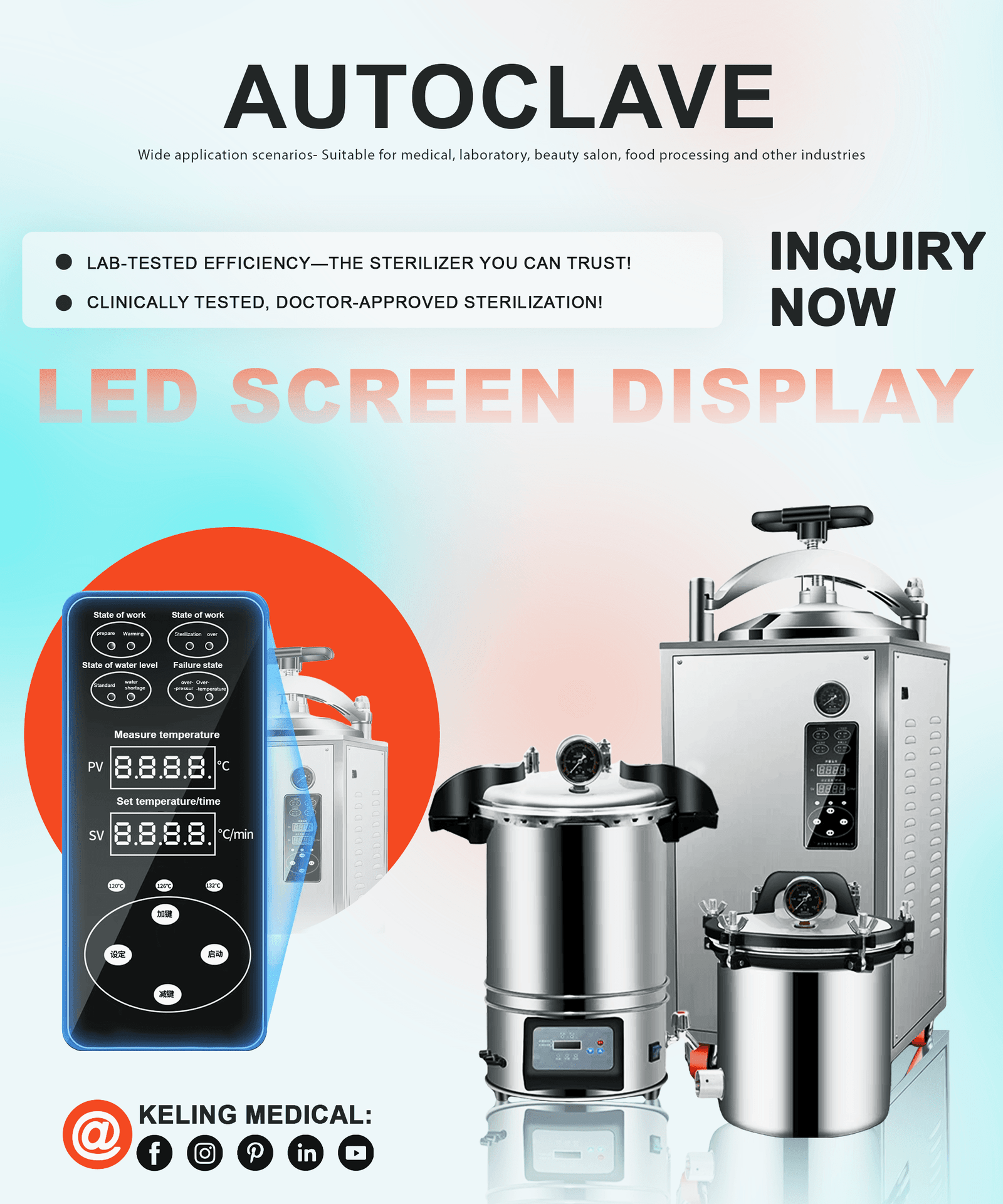
Dental professionals, distributors and procurement specialists must choose proper dental sterilization machines to ensure their operations run smoothly. This article examines dental autoclave pricing and features while discussing key purchasing considerations so you can make knowledgeable buying choices for your business.
The sterilization process forms the foundation of dental care practices because it protects both patients and dental personnel and satisfies health regulation standards. These reasons demonstrate why sterilization procedures are vital for dental practice operations:
The nature of dental work exposes instruments to blood, saliva, and tissue which results in potential contamination.
Sterilization removes dangerous microbes and lowers the chance of infections.
Dental clinics must follow strict sterilization protocols set by regulatory agencies.
Dental clinics maintain ISO and CE standard compliance by using machines that are certified for dental sterilization.
Patients develop trust and confidence when they see that their environment remains both clean and sterile.
By showing dedication to cleanliness and safety practices you can increase the number of patients who return to your clinic.
By preventing exposure to infectious agents, sterilization ensures dental professionals remain safe.
The price of dental sterilization machines depends on their size as well as their technological features. Below is a general price breakdown:
Price Range: $2,000 – $5,000
The entry-level models feature basic functions together with manual controls and capacities between 10 to 20 liters.
This equipment meets the demands of dental clinics with limited space or dental practitioners working independently.
Price Range: $5,000 – $10,000
The machine includes digital controls alongside advanced sterilization cycles and offers medium volume capacity between 20 and 40 liters.
Well-suited for medium-sized dental practices that require moderate levels of sterilization.
Price Range: $10,000 – $20,000+
These autoclaves feature complete automation with capacities exceeding 40 liters and superior construction standards.
This autoclave solution serves busy dental practices that need to process large quantities of instruments.
Dental sterilization machines are classified as either portable or fixed models. The appropriate autoclave choice for your dental clinic should match both its operational demands and financial limits. Below is a detailed comparison:
The autoclave offers a small footprint design paired with reduced weight for convenient transportation.
Best suited for small dental clinics or mobile dental services.
Price Range: $2,000 – $7,000
Portable models offer fewer sterilization features and a reduced capacity compared to fixed models.
This model provides greater capacity along with advanced sterilization technology and durable build quality.
Advantages: Suitable for high-demand dental practices.
Price Range: $5,000 – $20,000+
These units require both a larger initial investment and a designated space for installation.
When selecting dental clinic sterilization equipment you need to carefully evaluate various important factors.
Selecting the appropriate dental sterilization machine demands careful evaluation to find the ideal model for your dental clinic. These essential factors should guide your decision-making process.
Assess how many dental tools you sterilize each day at your clinic.
Select a sterilization machine that can handle your operational load without causing any service interruptions.
Gravity Displacement: Suitable for basic sterilization needs.
Vacuum Cycles ensure effective sterilization of heat-sensitive materials while maintaining complete sanitation.
Select stainless steel instruments for their long-lasting properties and ability to withstand corrosion.
Install insulation on the machine to reduce heat exposure while saving energy.
The implementation of digital controls alongside programmable cycles makes the operation simpler while enhancing overall efficiency.
Select equipment models that feature user-friendly interfaces and straightforward operating instructions.
Ensure that the machine holds necessary international certifications which include ISO as well as CE.
Select a supplier which provides both full warranty coverage and dependable after-sales service.
Scheduled maintenance helps maintain peak performance levels while prolonging the machine’s operational life.
Dental sterilization machines are vital for maintaining hygiene and safety in dental practices. Their price varies based on features, capacity, and technology, making it essential for distributors, resellers, and procurement professionals to understand their options before purchasing.
By evaluating your clinic’s needs and comparing models, you can find a reliable sterilization machine that fits your budget while meeting industry standards. For more insights into sterilization machine pricing, check out our next article: Steam Sterilizer Machine Price.
If you need assistance or want to request a quote, feel free to contact us at Keling Medical using the details below.
The average price ranges from $5,000 to $10,000, depending on size and features.
Yes, portable autoclaves are effective for small-scale sterilization needs but may not be suitable for high-demand clinics.
Regular maintenance is recommended at least once a year to ensure optimal performance and compliance with safety standards.
Entry-level models are best suited for small clinics or individual practitioners. Busy clinics should opt for mid-range or high-end models.
Most suppliers offer warranties ranging from 1 to 5 years, depending on the model and manufacturer.
For more information or to request a quote, contact us today:
Email: inquiry@shkeling.com
WhatsApp: Click to Chat
Website: https://autoclaveequipment.com/
Let us help you find the perfect sterilization solution for your dental practice!

The autoclaving process serves as an essential sterilization practice utilized across medical, laboratory, and research facilities to protect glassware and instruments through effective sterilization. High-pressure steam eliminates pathogens during this

The autoclaving process serves as an essential sterilization practice utilized across medical, laboratory, and research facilities to protect glassware and instruments through effective sterilization. High-pressure steam eliminates pathogens during this
The autoclaving process serves as an essential sterilization practice utilized across medical, laboratory, and research facilities to protect glassware and instruments through effective sterilization. High-pressure steam eliminates pathogens during this
The autoclaving process serves as an essential sterilization practice utilized across medical, laboratory, and research facilities to protect glassware and instruments through effective sterilization. High-pressure steam eliminates pathogens during this
The autoclaving process serves as an essential sterilization practice utilized across medical, laboratory, and research facilities to protect glassware and instruments through effective sterilization. High-pressure steam eliminates pathogens during this
The autoclaving process serves as an essential sterilization practice utilized across medical, laboratory, and research facilities to protect glassware and instruments through effective sterilization. High-pressure steam eliminates pathogens during this